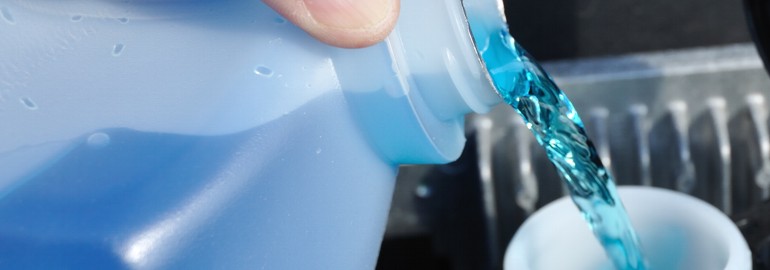Auto Repair – Fluids and Maintenance
Brake Fluid Flush – Cooling System Flush – Transmission Fluid Flush – Power Steering Fluid Change
THESE FLUIDS ARE REALLY IMPORTANT TO YOUR CAR. CHECK THESE FLUIDS OFTEN AND FLUSH OR REPLACE ACCORDING TO YOUR MANUFACTURER’S RECOMMENDED INTERVALS
Your car relies on several different fluids to keep it running smooth and performing well. In some cases, it’s really about safety too!
Regardless if it’s a brake fluid flush or cooling system flush, we’ve detailed the important information you need to know about these fluids.
Brake Fluid Flush – Auto Service and Maintenance
Brake Fluid Flush
 Why should I Get a Brake Fluid Flush?
Why should I Get a Brake Fluid Flush?
Your brakes are really made up of two different systems – one is the mechanical system that includes the brake pads, brake shoes, brake rotors or brake drums, plus the brake cylinders, lines and master cylinder. The second system is the hydraulic system that includes brake fluid.
It’s the hydraulic system is critical to the operation of your car’s brakes because it provides the power to make all the mechanical components work. But understand that brake fluid is very hygroscopic. That means it absorbs moisture.
When brake fluid absorbs moisture, it becomes contaminated and has to be flushed and replaced.
How do you know if your brake fluid is contaminated?
The simple test is by looking at the color of your brake fluid. New brake fluid is almost clear and resembles the color of apple juice. When it gets contaminated and absorbs moisture, the brake fluid turns a darker ‘brownish’ color.
When the brake fluid is dark in color – it’s contaminated and needs to be replace.
This is even more important on today’s vehicles that are equipped with ABS Brakes – Anti Lock Brakes. That’s because the Anti-Lock Brake systems uses several different valves to route the brake fluid. Contaminated brake fluid could lead to more costly damage of the brake lines and valves.
We also recommend you check your owner’s manual for the vehicle manufacturer’s recommended service interval for brake fluid flush or replacement.
Click here for more about brakes, brake service and brake pad replacement.
Other visitors wanted to…
Book An AppointmentGet CouponsFind Us Fast Ask A MechanicSee Our Auto ServicesRead Customer Reviews
Cooling System Flush
 How Do I Know if I need a Cooling System Flush and Fill?
How Do I Know if I need a Cooling System Flush and Fill?
Engine coolant or antifreeze is an important fluid. Its primary job is to help transfer heat. The coolant absorbs the heat from your engine – and is then cooled in the radiator.
Also know that the engine coolant is used to provide heat for the passenger compartment. The water pump circulates engine coolant through your car’s heater. The blower motor pushes cold outside air over the heater to create heat (and provide temperature control) for the passenger compartment.
Engine coolant or antifreeze is also designed to handle higher engine temperatures without your car’s engine boiling over. Under pressure (created by the radiator cap), the correct engine coolant can increase the boiling point of your cooling system to 260*F or higher.
Coolant or antifreeze also contains cooling system additives like lubricants and rust inhibitors. These additives help to keep moving parts of your cooling system, like the water pump, lubricated. The rust inhibitors help prevent the buildup of internal corrosion.
Internal corrosion in your car’s cooling system reduces the efficiency of heat transfer. That’s because the corrosion builds up and smaller passages in the radiator and heater become clogged. The reduced efficiency means your radiator will not be able to cools as well as it should. It also means that your car heater may not provide the heating you need.
Flushing your cooling system removes any contamination. Replacing engine coolant helps assures your cooling system will not boil over – but also replenishes the additives like lubricants and rust inhibitors to keep your cooling system corrosion free.
Get more information about proper cooling system maintenance and how to avoid costly repairs when your engine overheats!
Other visitors wanted to…
Book An AppointmentGet CouponsFind Us Fast Ask A MechanicSee Our Auto ServicesRead Customer Reviews

